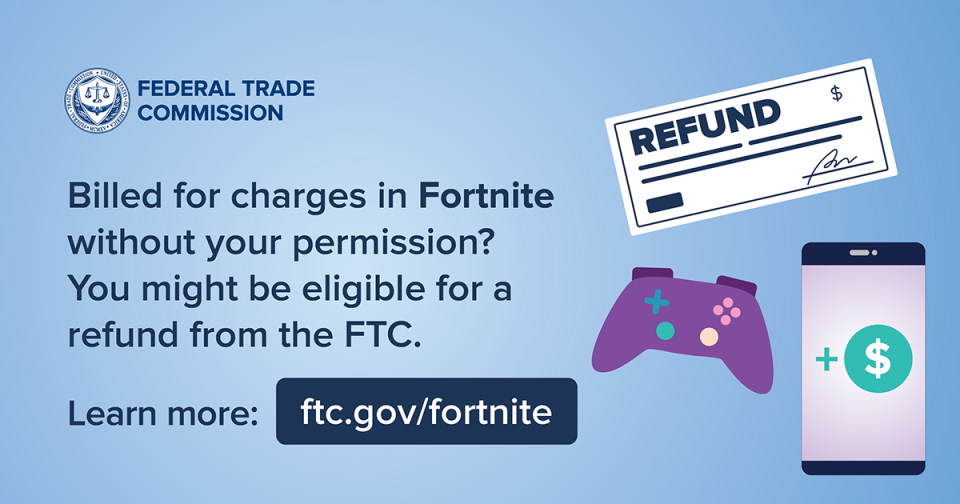FTC helps Fortnite players against charges for unconfirmed purchases.
FTC helps Fortnite players score a victory royale against Epic Games.
These days, video games have shops just like online stores. Games like Fortnite, developed by Epic Games, sell gear, character “skins,” and dance moves. (Think Darth Vader wielding an umbrella and flossing.) But what if the game saved your payment info (without asking you first), didn’t give you the chance to confirm purchases, made it hard to cancel them, and locked you out of the game if you tried to dispute the charge?
That, says the FTC, is what happened to some Fortnite players and parents. If you bought something in Fortnite, you might not have known that Epic saved your payment information. Or known that your kids could buy things – hundreds of dollars of in-game things – without you confirming their purchase, according to the FTC. And, says the FTC, Fortnite’s setup was so confusing that millions of players were charged for items they didn’t want.
Even worse, Epic made it difficult or impossible to cancel charges, and if you tried to dispute a charge with your credit card company, you might have found yourself unexpectedly and permanently locked out of Fortnite. You know, the game where you might have just spent hundreds of dollars without your knowledge or permission. That also meant you’d lose access to all the content you actually wanted and paid for — simply because you disputed a charge.

Thanks to a settlement with the FTC, Epic now has to make sure players and parents confirm purchases. They can’t lock you out of the game for disputing charges. And Epic also has to pay $245 million to those they unfairly charged or locked out of a Fortnite account.
But that’s not all — while this settlement with the FTC could protect your wallet, another Epic settlement with the FTC could protect your privacy.
The gift of privacy for Fortnite players
FTC has reached another settlement with Epic about its handling of privacy for kids and teens who played Fortnite.
When playing Fortnite, you might get matched up with other players to battle it out until there’s just one player or team left. Those players include kids and teens who make up a big part of the hundreds of millions of people who play Fortnite. And it also includes adults — anyone really.
What’s the problem? The FTC says the game’s default settings were not private — voice and text chat were automatically on, and turning that off was not easy. That meant players’ voices, including kids and teens, were automatically broadcast to friends and strangers alike. That also meant anyone who saw your kid’s display name, which was also automatically public, could send a friend request. So strangers could play with — and potentially talk and chat with — them again. This, says the FTC, resulted in kids being bullied, threatened, and harassed, including sexually, through Fortnite. For two years, Epic also didn’t get parents’ permission to collect information from their kids under 13 — something required by the Children’s Online Privacy and Protection Act.
To settle the FTC’s charges, Epic has agreed to change its default settings for kids and teens from public to private, so it blocks open voice and text chat by default. Epic will also put a privacy program in place and pay a $275 million penalty to the U.S. Treasury. (While there won’t be refunds under this settlement, you might be eligible for money back if you were unfairly charged.
If you’re a parent, new games are almost certainly in your future this holiday season. Before your kids or teens start playing:
- Know that usernames might be public. Talk about usernames. The best ones won’t include a user’s real name or other personal details about them.
- Check the privacy settings in the game. If the settings are hard to find or hard to make changes to, tell the FTC.
If you think a company is breaking the rules when it comes to you or your kids’ or teens’ privacy, tell the FTC at https://reportfraud.ftc.gov/

